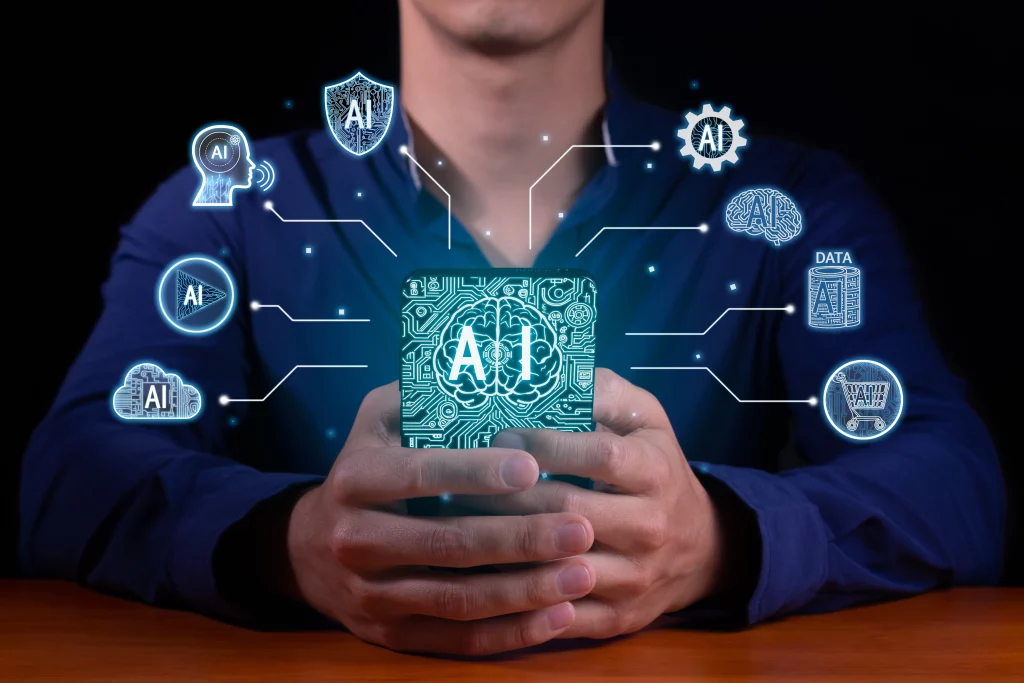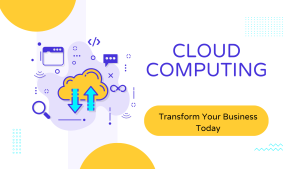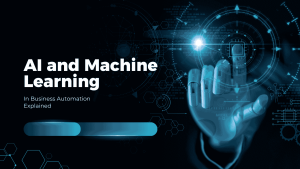Artificial Intelligence (AI) is the future. It is transforming the way we live, work and interact with technology. And building an AI app can be a game-changer for your business. However, developing an AI app may seem daunting to many. But fret not, in this blog post, we will provide you with a step-by-step guide on how to build an AI app.
We will start by understanding the basics of AI and its components. Then we will dive into the best uses of AI in mobile apps along with some use cases and case studies. Furthermore, we will discuss the essential tech stack required for AI app development and guide you through the procedure of creating an AI-based application. Lastly, we will highlight the benefits of AI mobile apps for businesses along with their role in streamlining talent acquisition, enhancing human capital management, improving decision-making processes, and security in apps. So, let’s get started!
Understanding Artificial Intelligence (AI)
Artificial Intelligence (AI) enables machines to perform tasks that typically require human intelligence. This advanced technology has the ability to analyze and interpret vast amounts of data, making predictions and recommendations based on patterns and trends.
AI applications can be found in various industries, such as healthcare and finance, revolutionizing the way we interact with technology. By harnessing the power of AI, businesses can streamline processes, enhance decision-making, and improve overall efficiency.
Embracing AI is crucial in today’s digital landscape, where data analytics and innovative solutions are key to staying competitive.
Importance of AI in Modern Application Development
AI-powered applications have become increasingly important in modern application development.
- They enhance customer satisfaction and improve user experience by personalizing the app based on user preferences.
- AI also saves time and resources by automating repetitive tasks.
- It enables real-time data analysis, providing valuable insights for better decision-making.
- In business processes, AI improves efficiency and accuracy, leading to higher productivity.
- With the integration of NLP, data science, and AI algorithms, developers can create mobile apps that offer unique ideas and seamless user interfaces.
As AI continues to advance, it is essential for businesses to leverage its capabilities to stay competitive in today’s digital landscape.
Components of AI
Machine learning is a crucial component of AI, allowing systems to learn from data and improve their performance.
Deep learning, a subset of machine learning, utilizes neural networks to tackle complex tasks by simulating the structure and function of the human brain.
Natural language processing (NLP) empowers AI systems to comprehend and interpret human language, while computer vision enables them to analyze and understand visual information.
AI algorithms play a vital role in processing and analyzing data to make intelligent decisions.
These components collectively contribute to the capabilities of AI applications.
Role of Machine Learning and Deep Learning in AI
Machine learning and deep learning play a crucial role in the development and advancement of AI. These techniques enable AI systems to identify patterns, make predictions, and excel at complex tasks like image and speech recognition.
By training machine learning models with large datasets, AI systems can continuously improve their performance over time. The applications of machine learning and deep learning are vast, ranging from healthcare to finance and even self-driving cars.
With their ability to analyze data and learn from it, these techniques are transforming industries and driving innovation. Harnessing the power of machine learning and deep learning is key to building successful AI applications.
Use Cases of AI in Mobile Apps
AI in mobile apps offers a range of use cases:
- AI-powered chatbot apps provide instant customer support and improve user engagement.
- AI apps with image recognition can identify objects and provide relevant information to users.
- AI enhances voice recognition, enabling voice commands and virtual assistants for a seamless user experience.
- AI enables automated data analysis, generating valuable insights for data-driven decision making.
- Mobile apps with AI capabilities can also utilize machine learning models for predictive analytics, helping businesses forecast trends and make proactive decisions.
- AI-powered personalization features in mobile apps can deliver tailored content and recommendations to users based on their preferences.
- AI in mobile apps improves overall functionality, creating more engaging and user-friendly experiences.
These use cases demonstrate the versatility and potential of integrating AI into mobile app development.
Case Study: AI Chatbot Apps
AI chatbots are revolutionizing customer support and assistance, thanks to their ability to provide instant responses. Using natural language processing (NLP), chatbots can understand and respond to user queries, mimicking human-like conversations.
One unique aspect of AI chatbots is their capability to handle multiple conversations simultaneously, ensuring efficient customer service. By reducing response time and providing personalized interactions, AI-powered chatbots significantly improve customer satisfaction.
Consequently, businesses across various industries are leveraging the power of chatbots to enhance their customer service capabilities. From e-commerce to healthcare, AI chatbot apps are transforming the way businesses engage with their customers.
Case Study: AI Apps with Image Recognition
AI apps with image recognition utilize advanced technology to identify objects, faces, and landmarks. This capability opens up a world of possibilities in various industries. Image recognition technology also enables augmented reality experiences, enhancing user engagement and functionality.
In addition to entertainment and gaming, AI image recognition can be used in security and surveillance systems, improving safety and reducing the risk of unauthorized activities.
Furthermore, these apps have the potential to assist visually impaired individuals by providing them with valuable information about their surroundings. Image recognition technology is revolutionizing fields like healthcare and e-commerce, creating new opportunities for businesses and consumers alike.
Essential Tech Stack for AI App Development
When it comes to developing AI applications, having the right tech stack is crucial. Python and R are the go-to programming languages for AI development, offering flexibility and powerful libraries for data analysis.
AI platforms like TensorFlow and PyTorch provide essential tools and frameworks to facilitate AI development with their vast range of functionalities. Additionally, APIs and cloud services grant easy access to AI capabilities, enabling developers to integrate advanced features seamlessly.
However, developing AI apps requires expertise in machine learning and data analysis, ensuring accurate modeling and efficient algorithms. Choosing the right tech stack ensures a successful AI app development journey.
Programming Languages for AI
Python is widely used in AI development due to its simplicity and extensive libraries. R is popular for statistical analysis and data visualization. Java and C++ are preferred for high-performance AI applications.
MATLAB provides a convenient environment for prototyping and research. The choice of programming language depends on project requirements and expertise.
Python’s simplicity and libraries make it a versatile choice, while R excels in statistical analysis.
Java and C++ offer performance benefits, and MATLAB is ideal for research.
Ultimately, the right programming language should align with the project’s needs, ensuring efficient and effective AI app development.
AI Platforms and Libraries
When building an AI app, it’s essential to choose the right platform and libraries based on project requirements and compatibility.
TensorFlow, an open-source AI platform developed by Google, is widely used for its flexibility and extensive community support.
PyTorch, developed by Facebook, is known for its dynamic neural networks, making it a popular choice among researchers.
IBM Watson offers a range of AI services and tools, while Azure Machine Learning by Microsoft provides cloud-based AI development.
By leveraging these platforms and libraries, developers can create powerful AI applications that harness the capabilities of artificial intelligence.
Frameworks and APIs for AI App Development
Frameworks and APIs play a crucial role in the development of AI applications. They provide ready-to-use tools that simplify the development process and save valuable time and effort.
Popular frameworks like TensorFlow and PyTorch offer powerful capabilities for building AI models, while APIs like Google Cloud AI and Microsoft Azure Cognitive Services provide pre-trained models for quick integration. Choosing the right framework and API depends on your project requirements.
By leveraging these resources, developers can streamline the development process and create innovative AI apps. So, when building an AI app, consider using frameworks and APIs to enhance efficiency and effectiveness.
What are the benefits of AI mobile apps for business?
AI mobile apps offer numerous benefits for businesses:
- They enhance customer service through personalized recommendations and real-time query resolution.
- These apps improve customer satisfaction with seamless user experiences and intuitive interfaces.
- By automating business processes, they increase efficiency and reduce human error.
- AI apps also provide actionable insights for marketing strategies through social media analysis.
- Additionally, they enable augmented reality experiences through image recognition and computer vision, creating unique opportunities for businesses.
How to Create an AI-based Application: A Detailed Procedure
Building an AI-based application involves a step-by-step process. Begin by identifying the problem you want to solve using AI technology. Then, prepare and clean the data for training the AI model. Select the most suitable algorithm for your application and train it using the prepared data. Next, decide on the programming language that best suits your project requirements. Choose the platform for AI app development based on your deployment needs. Develop the application using the selected framework and tools, and thoroughly test it before deployment. Remember to continuously monitor and update the app to improve its performance.
Step 1: Identification of the Problem
To build an effective AI app, start by clearly defining the problem your app aims to solve. Understand the pain points and challenges faced by your target users, conducting thorough research to gather relevant insights.
By identifying the specific goals and objectives of your AI application, you can ensure that it addresses the needs of your users effectively. This initial step sets the foundation for the rest of the development process, guiding the subsequent stages of data preparation, algorithm selection, and training.
By accurately identifying the problem, you can create a successful and impactful AI app.
Step 2: Data Preparation
To build an AI app, the second step is data preparation. It involves collecting and curating high-quality data that is relevant to your application.
This data needs to be cleaned and preprocessed to remove any inconsistencies or outliers. Proper labeling, formatting, and organization of the data are essential for effective analysis.
Additionally, it is important to split the data into training and testing sets for model evaluation. By following these steps, you can ensure that the data used in your AI app is of high quality and ready for further analysis and development.
Step 3: Selection of Suitable Algorithm
Considering various machine learning algorithms based on your problem type is crucial in building an AI app. It’s important to evaluate the strengths and weaknesses of different algorithms to make an informed decision.
Choosing the algorithm that aligns with your project goals and requirements is essential. Factors like accuracy, scalability, and interpretability should be taken into account during this step.
By selecting the most suitable algorithm, you ensure that your AI app performs optimally and delivers the desired results.
Step 4: Training the Algorithm
To train the algorithm, the prepared data needs to be fed into the chosen algorithm. It is important to optimize the algorithm parameters in order to improve its performance.
Techniques like cross-validation can be used to assess the model’s generalization ability. The model should be refined iteratively until the desired accuracy is achieved. This step is crucial in building an AI app as it ensures that the algorithm learns from the data and can make accurate predictions or decisions.
By training the algorithm effectively, the AI app can provide valuable insights and solutions to users.
Step 5: Choosing the Right Programming Language
In the process of building an AI app, one crucial step is choosing the right programming language. It is essential to select a language that is suitable for AI app development.
Factors like community support, library availability, and ease of use should be considered. Popular options for programming languages in AI app development include Python, Java, and C++. It is important to choose a language that aligns with your team’s expertise and project requirements.
By selecting the right programming language, you can ensure that your AI app development process is smooth and efficient.
Step 6: Platform Selection for AI
In the planning stage of your AI app, it’s crucial to decide on the platform for deployment. Consider factors like scalability, cost, and integration capabilities.
Cloud platforms such as AWS and Google Cloud offer flexibility and scalability, while on-premises servers provide more control over data. Ensure that the chosen platform aligns with your project requirements and budget.
Making the right platform selection is essential for the success of your AI app.
Step 7: Development of the App
Once you have selected the suitable programming language and framework, it’s time to develop the AI app.
Start by implementing the trained algorithm into the application, ensuring a smooth integration of AI features with the user interface and functionality.
Following best practices for efficient and secure coding is crucial at this stage. By leveraging the expertise of software engineers, the app can be developed to meet the unique requirements of your project.
This development phase is essential for creating a simple AI app that delivers on its promise of intelligent functionality.
Step 8: Testing, Deployment, and Monitoring
Thoroughly testing an AI app for functionality, accuracy, and performance is crucial. During the testing phase, it’s important to address any bugs or issues that might arise.
Once the app has successfully passed the testing stage, it can be deployed to the chosen platform or app store. However, the journey doesn’t end there.
Continuous monitoring of the app’s performance and gathering user feedback is essential. This allows for regular updates and improvements to the AI models, based on real-world usage.
By following these steps, developers can ensure that their AI app is robust and delivers a seamless experience to users.
Crucial Role of AI in Business Applications
AI plays a crucial role in transforming business processes and driving innovation across industries. One key aspect is utilizing AI to improve customer service and satisfaction by providing personalized experiences.
With AI-driven personalization, businesses can enhance user engagement and loyalty. Another significant application of AI is in data analysis and decision-making. By leveraging AI algorithms, businesses can extract valuable insights from large datasets and make informed decisions.
Additionally, AI has the potential to automate various business operations, increasing efficiency and productivity. This automation allows companies to streamline processes and focus on strategic initiatives.
Streamlining Talent Acquisition with AI
Leveraging the power of AI can streamline the talent acquisition process and revolutionize candidate selection. With AI-powered tools for resume screening and applicant tracking, recruiters can efficiently identify top candidates based on job requirements.
Machine learning algorithms play a crucial role in this process, helping to eliminate bias and enhance diversity and inclusion efforts. By utilizing AI technology, organizations can improve the overall efficiency and effectiveness of their talent acquisition strategies.
Harnessing the capabilities of NLP, data science, and intelligent algorithms, AI is transforming the way companies find and hire top talent.
Enhancing Human Capital Management with AI
Leveraging the power of artificial intelligence (AI), businesses can optimize their workforce planning and talent management strategies. By using AI-powered analytics, companies can evaluate employee performance and identify areas for development.
Machine learning algorithms can help in identifying skill gaps and providing targeted training to employees. Furthermore, personalized AI-driven solutions can enhance employee engagement and satisfaction.
AI can also be leveraged to predict and prevent employee turnover, allowing businesses to take proactive measures. With these advancements in AI, human capital management is evolving and becoming more efficient than ever before.
Prominent AI Apps Making a Difference
Prominent AI apps are making a significant impact in various domains.
Google Assistant, a powerful AI-driven virtual assistant, offers a range of features and benefits to users. Amazon Alexa integrates seamlessly with smart home devices, providing users with an intuitive and connected experience. Replika, an innovative AI chatbot app, showcases unique conversational capabilities that mimic human interactions.
Voice recognition technologies like Siri utilize AI to understand and respond to user commands effectively. Personal digital assistants have the potential to be transformed by AI, revolutionizing how we interact with our devices. These prominent AI apps are driving advancements and shaping the future of technology.
Google Assistant
Google Assistant utilizes the power of natural language processing (NLP) and machine learning to deliver its impressive functionality. This AI-powered assistant offers real-time assistance, allowing users to seamlessly interact with their devices through voice commands.
The integration of Google Assistant with various apps and devices enhances user convenience and productivity. By analyzing user data and preferences, it creates personalized experiences and provides helpful information.
As AI app development continues to evolve, the future possibilities for Google Assistant are vast. It has the potential to revolutionize the way we interact with AI apps, making them even more intuitive and user-friendly.
Amazon Alexa
Amazon Alexa is an AI-powered virtual assistant that has revolutionized smart home automation. With its advanced voice commands, users can control various devices and perform tasks effortlessly.
The integration of third-party apps with Alexa expands its functionalities, allowing users to access a wide range of services. The speech recognition technology behind Alexa utilizes machine learning algorithms to accurately understand and interpret user commands. This enhances the user experience and contributes to high customer satisfaction.
Moreover, the potential of Amazon Alexa goes beyond the realm of personal use and holds immense possibilities for businesses. By leveraging Alexa’s capabilities, businesses can streamline their operations and deliver enhanced services.
Replika
Replika is an AI chatbot companion that aims to simulate human-like conversations. This innovative technology has the potential to impact mental health and well-being by providing personalized emotional support.
With Replika, users can engage in meaningful and therapeutic conversations, helping them navigate through their daily challenges. However, it’s important to consider the limitations and ethical considerations of AI chatbot companions.
While Replika can offer valuable support, it should not be seen as a replacement for human interaction or professional help. As AI continues to advance, exploring the potential of AI chatbots in providing emotional support becomes increasingly important.
How Does AI Enhance Security in Apps?
AI plays a crucial role in enhancing app security. It enables real-time anomaly detection, strengthens user authentication and authorization, and helps identify and mitigate data breaches. However, implementing AI-driven app security also comes with challenges and ethical considerations.
Can AI Improve Decision Making in Business?
AI-powered apps have the potential to revolutionize decision making in business. By analyzing vast amounts of data, these apps can provide valuable insights that humans might miss. With real-time analysis and automation of repetitive tasks, AI can help businesses make quicker and more accurate decisions.
Conclusion
To sum up, building an AI app requires a thorough understanding of artificial intelligence and its components. Machine learning and deep learning play crucial roles in AI app development. Identifying the problem, data preparation, algorithm selection, and training are essential steps in creating an AI-based application. It is also important to choose the right programming language, platform, and tech stack for development. AI mobile apps offer numerous benefits for businesses, from streamlining talent acquisition to enhancing human capital management. Prominent AI apps like Google Assistant, Amazon Alexa, and Replika are making a significant difference in various industries. Additionally, AI enhances security in apps and has the potential to improve decision-making processes in businesses. With the right knowledge and resources, you can successfully build an AI app that revolutionizes your industry.
If you’re interested in turning your AI app idea into reality or need AI app development services, contact us today. Our team of experts can help you build an AI app that revolutionizes your industry and meets your specific needs.
We are thrilled to announce that Techwink Services has been recognized as a Research Partner in a recent article by GoodFirms. This acknowledgment highlights our commitment to innovative solutions. Read the article here to learn more about our expertise and contributions.



